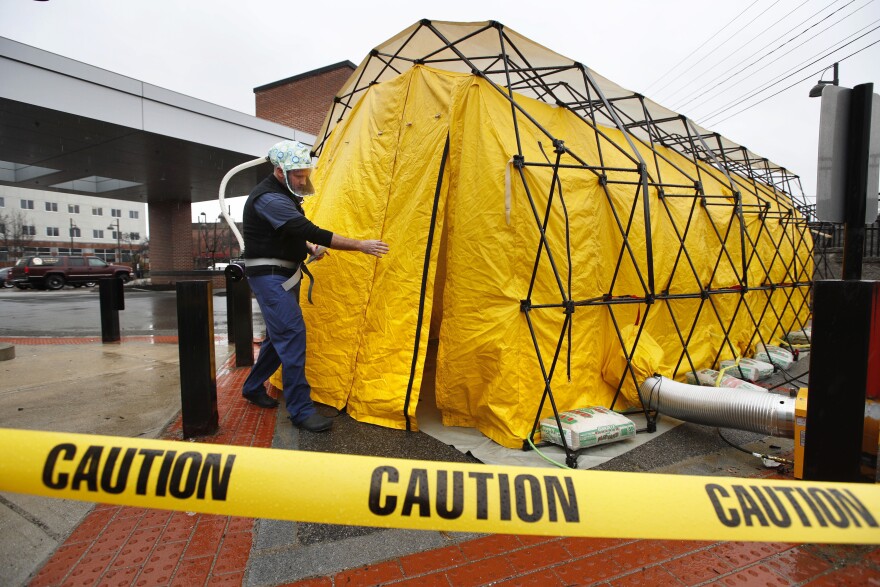For many Mainers, there is still come confusion about who should see a doctor and when, and who should be tested for possible infection by the new coronavirus.
Dr. James Jarvis of Northern Light Eastern Maine Medical Center and Dr. John Alexander of Central Maine Health Care told Maine Calling host Jennifer Rooks that if someone calls in to report flu-like symptoms, they’ll be told to stay home.
This excerpt has been edited for clarity.
(Related: What Mainers Need To Know About The Coronavirus)
Alexander: Just like any other respiratory illness, like the flu, we give them the advice that based on how they sound, based on what their symptoms are, if they’re comfortable staying home they should stay home. Because the way we take care of this disease is through symptom management — hydration, Tylenol, ibuprofen.
It’s when we hear from patients that they have some risk factors, they’re of an older age — 65 is typically the age we use right now, but that’s slightly variable — if they have other conditions like heart disease or high blood pressure, if they have any reason for being immune system suppressed, like if they are cancer therapy patients, then that raises a red flag for us and we want those patients to be seen. Also if those patients are having more severe symptoms, like they’re having difficulty breathing or they’re having high uncontrollable fevers, those are the patients that we want to make sure that we get seen.
But ultimately, our goal is to try to really reassure our patients and explain to them what this is, explain to them what they can do to take care of themselves. But there are some patients who just feel like they need to be seen, and we’re trying to create pathways so that those patients can get the care that they need and get that reassurance without necessarily having to go through the entire process of either testing or even in-person screening.
Rooks: Who qualifies right now to get tested?
Jarvis: First and foremost, we are not testing people who are asymptomatic. That means that if you have not exhibited a fever or any respiratory symptoms like a runny nose, cough, sore throat or lung problem, the test is not a good test for those individuals, because the result may be inaccurate. It could say that you don’t have the virus yet, but it may simply be that you haven’t built up enough of the virus. And so we’ll be telling people that they’re negative, and that may lead them to think that they can go out into the community when frankly, they continue to spread the disease.
So the first cutoff for us is whether you’re symptomatic or not. And then we look at risk factors. I think we’re very quickly coming to the point where we’re going to say that those people with low-level symptoms, with just upper respiratory coldlike symptoms, who are otherwise healthy, that those individuals probably don’t need to be tested. So I think there’s going to be a little bit of some leeway there. The main people who need to be tested are the same ones that Dr. Alexander talked about, that we really do want to have some face-to-face contact with, which is those patients who are in the high risk areas: people over the age of 65, people with heart disease, people with lung disease and people who have some kind of immunocompromise, like those being treated for cancer.
Rooks: When you say people with lung disease, does that include people with asthma? Maine has one of the highest rates of asthma, as you know, in the country.
Jarvis: So I think it again depends on the severity of that illness. Certainly somebody who’s taking medication every single day to keep their asthma under control would be somebody who we would consider at risk that this virus could cause more severe symptoms. And so yes, they should be checking in if they start having those symptoms of fever, or upper respiratory symptoms like a cold or cough, something like that before it gets down to being a lower respiratory symptom, where we’re talking about pneumonia and respiratory compromise.
Rooks: If you are carrying this and you have no symptoms, can you still spread it?
Jarvis: So the answer to that is we believe so. We think that’s actually what’s happened in other parts of the country where they’ve seen community spread, before we started seeing some community spread here in Maine. That seems to follow the epidemiological curve that we’ve seen in other countries as well. So people who appeared to be well actually already weren’t affected with the virus, they just hadn’t had symptoms yet, but were able to spread that. And so that is the reason why we’re talking about social distancing. Just because you feel well does not mean that you can’t already have gotten the virus and then spread it to somebody else, particularly those that are vulnerable.
Alexander: We believe that there are certainly a number of people who will carry the virus and that without having any symptoms, there’s probably going to be some very low-grade symptoms that people won’t recognize as being an infection. And then there’s even going to be folks who may have the symptoms that — again, this can look like some other illnesses. It’s really the folks who have higher risk factors or have more severe illness that we want to make sure you get in front of a health care provider.
To listen to the full episode of Maine Calling, click here.



